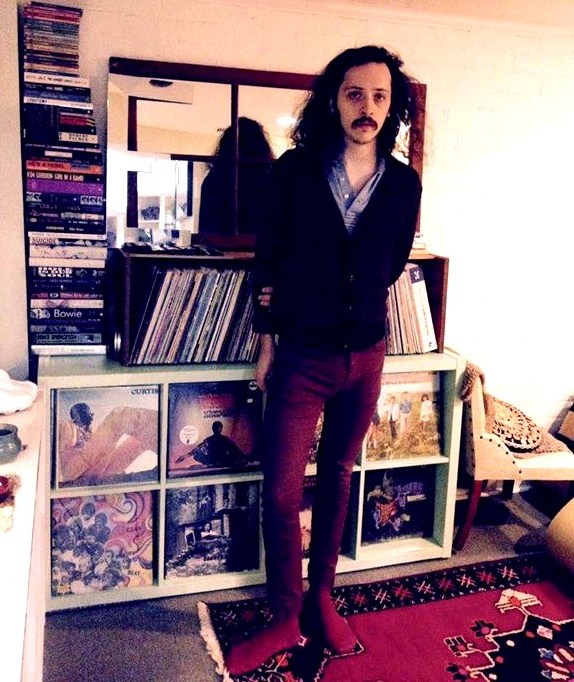.
Slip along the alleyway then down several steps to the basement door. Enter the musicians’ cave in east end Toronto, a well ordered small apartment featuring floor to ceiling shelves of LPs, books, speakers, record player, and an electronic keyboard. Hiccup of time travel; for a moment I feel it’s 1976 and I’m visiting a pal in one of those Vancouver basement apartments we all lived in.
Except it’s 2015 and Slim Twig (aka Max Turnbull) is very much a man of the day, maybe the hour. We live in an era when time collapses, and musicians freely pluck from the past, present and future.
A record rotates on the turntable, playing something spacey, jazz inflected. The ceiling is low and there is a distinct lack of windows. The faint whiff of incense is familiar. Sandalwood? Max, being tall and slim, just about brushes his head against the ceiling. A small wooden table with a pair of chairs, perfectly scaled for the space,reminds me that he shares this cozy apartment with his wife, musician Meg Remy (aka U.S. Girls) and that she is currently on tour. Max is about to head off for Europe for his own Slim Twig tour, with bandmates Simone Tisshaw-Baril on drums; Anthony Nemit on lead guitar; Carolyn Bezic on bass and vocals (and on last month’s U.S.A. tour, Tim Westberg on vocals and bass) to promote the new album: Thanks for Stickin’ with Twig. I’ve been listening to the record all week, falling into its sonic spell.
Max works with heavy distortion and fuzz, saturated in old-school psychedelia. Why disguise his voice this way? “I’m reticent about singing more plainly,’ he says. ‘Authenticity is not what I’m trying to do.’ He notes that ‘even the Dylan/Neil Young singer/songwriter voice is a projection. Playing yourself is a sort of persona.’ David Bowie, a man who’s been known to switch gears and image frequently, comes up as an influence.
Turnbull has been playing with personae since the beginning of his career, launching himself with a record of his own songs while still a teenager. The ‘Slim Twig’ name appears on that early disk and when I ask if the name, chosen so long ago, has become a burden, he allows that it would have made sense to switch to another name two records back, when his sound matured and changed radically. Reviewers of early records noted rockabilly elements, and indeed, he once wore pointy toed shoes and a pompadour hair stye. The music press can be literal; one can’t help but notice that some writers took Slim Twig to be a neo-rockability artist, which he never was. The gig was always about appropriating elements of genre, mashing styles and sonic impulses, to create something new. You never would have mistaken Twig for Carl Perkins, redux.
If he sported a goatee, he’d look like a young Frank Zappa.
When I spoke to him, Max’s fall North American tour had just wound up and he was prepping for a European tour in December. Max had been apprehensive going into American tour, for the usual reasons: would the audiences be dispiritingly small? How would the logistics work? He and his bandmates couch surf or bunk together in motel rooms on the road. ‘But I was on a positivity trip, realizing that I was doing exactly what I want to be doing, playing my own music and performing.’ There was the sense of a ‘direct mission’ in each day: travel/setup/performing. Mind you, the trip wasn’t without stress; en route to the border on the first day, Simone, the drummer, realized she’d scooped up her roommate’s passport by mistake. Turn the van around three hours’ in.
The concern about attracting small crowds is legitimate: Turnbull has attracted a good deal of attention and press in his career (he’s barely 27 years old), and he’s been prolific (half a dozen records of his own and multiple production credits and playing with other bands) yet he admits that ‘because each record is so stylistically different, it’s hard to create a fan base. It feels like with each album I start at square one.’ He confesses to feeling daunted by the prospect of ‘what my life will look like in years to come, how I’ll squeeze out a living.’ He’s frugal in his living habits, and allows that ‘the music is a consolation for that frugality.’ He says this in a straight-forward way, not a hint of whining. He is surrounded by the objects he loves; his family lives a block away in the Bain Co-Op where he was raised; and his cinderblock elementary school sits on its asphalt playground just down the road.
Turnbull composes by finding the ‘cracks between styles, forming a patchwork aesthetic–rather than making something in an established tradition’. He ‘composts’ diverse influences. A voracious consumer of music from the past and present, he allows that he’s a bit of a ‘Dad rocker’ pulling sounds from the 60‘s and 70‘s (Beatles –especially Rubber Soul and Revolver; Frank Zappa; David Bowie). There is a certain wry humour in his tone, because while he may appropriate elements of style from half a century ago, the sound he ends up with is less homage and closer to being newer -than-new, at least to my ears. In the current album, ‘I try to make music that is era ambiguous.’
What about the song on ‘Thanks for Stickin’ With Twig’ featuring a chorus that admonishes: ‘Live in Your Era.’ Kind of a joke, given the fact the song references the past throughout. There’s a meta thing going on in Twig’s music and if the listener is well versed in music of the present and of earlier decades, she’ll have fun recognizing the bits of composted material. I give in to the slowed-down drone voice, the fillips of pop, crashing metal, the parody of stoner state of mind. Which brings me to – what about this ‘stoner’ thing, in songs that embrace fuzz, distortion, repetition, not to mention the verse ‘stoned out of my mind’ ? Not exactly a subtle presentation.
‘I’ve cultivated the image playfully,’ Max insists. ‘I wasn’t involved with stoner culture in my teens, and in my 20’s weed has an impact on how I experience music.’ He aims to ‘create music that takes in that experience without having to smoke’ – by offering a ‘heightened atmosphere.’ ‘I don’t want to be a spokesperson for drug use,’ he hastens to say, ‘but it’s a valuable resource, a certain phrase can be heard in a different mode or perspective. Drugs can be a crutch, but useful.’ This is sounding sort of medicinal. He continues: ‘The poet, James Merrill would write a poem while sober, smoke, and different things would pop up.‘ Later, I look up a Paris Review interview with the eminent poet and discover that he used the Ouija board as a collaborator in his writing. Merrill adds this comment: “I do now and then take a puff of grass, or a crumb of Alice Toklas fudge, when I’ve reached the last drafts of a poem. That’s when you need X-ray eyes to see what you’ve done, and the grass helps. Some nice touches can fall into place.”
What you’ll hear in Twig’s new record, as well as in earlier work, is a fervent impulse towards sonic experimentation. I’m reminded of of the Nihilist Spasm Band, the group of London, Ontario artists who formed a noise band back in the ’60’s, in the way Twig samples and pushes unabashedly into the fringes of what music is, or could be. This is often challenging for the listener. One wouldn’t call Twig a tunesmith, though tunes lurk. On-line reviews approach the music from all angles, some as ranting unbelievers, and others as die-hard fans, eager to go along for the ride. Some writers find his work pretentious and overblown. Max himself confesses to ‘a sense of entitlement in my early 20’s. Now I’m humbled by being a musician trying to earn a living.’ A cranky Pitchfork review of the new album concludes, ‘But in Slim Twig’s incessant and overbearing winks to the camera, he’s lost sight of his own potential.’ Exclaim.ca is more willing to listen with open ears: ‘This gloriously woozy record is era-ambiguous and the sonic equivalent of a contact high.’
Let’s not overdo the stoner aspect; Turnbull is a perfectionist, deep in there with his ten thousand hours of painstaking effort. Being a Leo, ‘I’ve always liked to be the boss and show off. It’s helpful (in this line of work) to have a healthy ego and at the same time be aware of it.’ When he steps on stage ‘I feel I adopt something beyond my everyday personality. It’s supposed to be outrageous and confrontational; you’re expected to go beyond yourself.’ He shrugs. ‘It’s not that hard; I have an aptitude.’ I’ve seen him perform, long limbs thrashing as he takes over the stage, a nod to his rocker predecessors.
In earlier days he held a more ‘antagonistic attitude towards guitar playing,’ being more inclined to electronic experimentation. Now he feels that he can use the traditional setup of guitar/keyboards and drums. ‘ My taste has become less standoffish and punky. I’m old fashioned in that I like to bend convention but still create work that is sturdily made.’
Clickety click, the needle comes to the end of the record and Max reaches to flip it over.
The importance of visuals and video in Twig’s work can be explained by his upbringing. His parents, Ross Turnbull and Jennifer Hazel are writer/filmmakers and this was a family whose life ‘revolved around a constant engagement with culture. They were keen on us experiencing things together as a family unit; they took to parenting in a creative way — my sister (Lulu Hazel Turnbull, age 22) and I are pieces that my mother fostered.’
This is also a family that I’ve known, on and off, for over twenty years. I recall Jennifer telling me that the crew would hunker down in front of the VCR to watch what were clearly ‘adult’ movies, by artists like David Lynch. From the get-go, the kids were plunged into the world of art and film and literature. Max notes that his mother ‘spent the amount of time that a writer might have spent writing, on raising her children.’ He understands the sacrifice. Slim Twig music videos tend to be family affairs, directed by parents, starring Jennifer and LuLu, as well as Max. They are avant garde, tiny movies, complete unto themselves, and don’t reference the music in any literal way. Max has scored a couple of his parents’ feature length movies, and starred as lead actor in Sight Unseen.
When I ask about his acting career, Max is diffident. ‘Acting is a mechanism to make money. I don’t like auditioning and being on set, though I do like working on interesting stuff, like Sight Unseen and Dog Pound (where he played a juvenile inmate). He played Billy Zero in The Tracey Fragments, a film starring Ellen Page.
‘I’m a bit of a late bloomer,’ Max allows, referring to the fact he just left the family nest a year or so ago. ‘Meeting Meg turned my whole world over. I wouldn’t be as advanced in my music if I hadn’t met her. She’s a huge catalyst. And I think that me taking her seriously as an artist has been huge for her. Now she’s successful, signed with a great label, and she’s living the dream of making music and earning a living.’
Sitting knee to knee with this man, I feeling a sort of tenderness that is perhaps inevitable, considering I knew him as a kindergarten kid, then as adolescent. I recall a slightly worried child whose sudden smile broke open the clouds. Heading into the European tour in a few days, Max is getting stressed about the logistics. Where will they stay each night? Will the promoters look after them properly?
And what about plans post-tour? I’m staring at a fat volume of Dylan lyrics propped against the turntable. Maybe a foray into neo-folk? Not exactly. The plan is to record a version of funk music – thinking of Bowie’s ‘plastic soul’ album; white soul, a step sideways from the original ‘authentic’ genre. ‘I want to make music that has a physical impact,’ Twig says. ‘ So much of my music has been cerebral, focused on creating a space and state of mind. With funky drumming, you can put anything on top.’
Time to walk down the hallway and climb the steps to blink into the light of day. Musicians, as we know, are night owls, happiest in their subterranean lairs.
—Ann Ireland
.
Ann Ireland’s most recent novel, The Blue Guitar, was published by Dundurn Press in early 2013. Her first novel, A Certain Mr. Takahashi, won the $50,000 Seal-Bantam First Novel Award and was made into a feature motion picture called The Pianist in 1991. Her second novel, The Instructor, was nominated for the Trillium Award and the Barnes and Noble’s Discover These New Writers Award, and Exile was shortlisted for the Governor-General’s Award and the Rogers/Writers Trust Award. She is a past president of PEN Canada and coordinates Ryerson University’s Chang School of Continuing Education, Writing Workshops department. She lives most of the time in Toronto and part of the time in Mexico.
.
.




